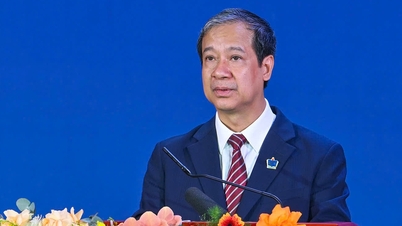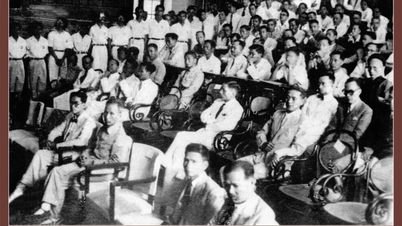Talking to VTC News Electronic Newspaper reporter, Mr. Vu Minh Duc - Director of the Department of Teachers and Educational Managers ( Ministry of Education and Training ) said that if comparing the appointment and salary arrangement between teachers in public educational institutions and civil servants in other sectors and fields, it can be seen that even though they are appointed to the positions of civil servants of grade I, grade II, grade III, teachers still enjoy a lower starting salary than many other sectors.

Mr. Vu Minh Duc - Director of the Department of Teachers and Educational Managers (Ministry of Education and Training)
Currently, only nearly 12% of teachers (university lecturers, college lecturers, vocational education teachers) are ranked in 3 salary groups: A1 (grade III) - A2 (grade II) - A3 (grade I), but nearly 100% of civil servants in other sectors and fields are ranked in these 3 salary groups.
According to statistics, only a maximum of 1.17% of teachers holding the title of senior lecturer (grade I) are ranked on the A3 salary scale (including A3.1 and A3.2), while in other sectors a maximum of 10% of civil servants are ranked on the A3.1 salary scale.
In addition, except for the medical and science-technology sectors, most civil servants in other sectors only require a university degree for all three job titles. On the contrary, in the education sector, except for preschool teachers whose starting requirement is college, all other education levels and job titles require teachers to have a university/master's/doctoral degree.
Therefore, when developing a plan to advise the Government to realize the policy of "teachers' salaries being ranked highest in the administrative career salary scale system" in the context of not yet implementing a comprehensive reform of salary policy according to Resolution 27, the important principle is "not to break the design of the general salary system for civil servants".
Therefore, the current salary coefficients of teachers according to Decree 204/2004 are maintained, and the Ministry proposes to add a "special salary coefficient". This coefficient helps all teachers, especially young teachers, new to the profession, regardless of region, to have a fair increase in income.
The bright spot when applying the special salary coefficient is that teachers are compensated for the lower difference between the current salary coefficient of teachers and the salary coefficient of civil servants in other sectors with the same training requirements and the same professional title. The highest salary coefficient that teachers receive is close to the coefficient of 8.00 like senior civil servants (grade I) in other sectors.
Mr. Duc gave an example, with the level of 1.25, it can be temporarily converted into the starting salary coefficient of preschool teachers changing from 2.10 to 2.63, the highest salary coefficient can change from 6.38 to 7.98. Meanwhile, the highest salary coefficient for civil servants is currently 8.00. Thus, with the special salary coefficient of 1.25, it is guaranteed that the salary of preschool teachers can reach the "highest" level.
With the level of 1.15, it can be temporarily converted into the starting salary coefficient of general education teachers, continuing education teachers, and university preparatory teachers changing from 2.34 to 2.69, the highest salary coefficient changing from 6.78 to 7.80. This coefficient is also close to the highest coefficient of current civil servants (8.00). At the same time, with the titles of university lecturers, college lecturers, and vocational education teachers, the special salary coefficient of 1.15 certainly ranks these teachers at the highest level compared to civil servants in other sectors and fields.

Chart comparing salary scales applied between teacher positions and civil servants in other sectors and fields. (Photo: Ministry of Education and Training)
However, in the context of the country's difficulties, the Ministry of Education and Training does not propose using a special salary coefficient to calculate allowances or to perform salary transfers. The salary transfer is still based on the salary coefficient that teachers currently receive.
Therefore, this calculation does not break the structure of the current salary system and the amount incurred is within the state budget's ability to pay (incurring about 11.3% compared to the total current salary cost). On the contrary, the total income of each teacher can increase from 0.58 million VND to a maximum of 3.34 million VND/person/month.
Although the specific salary coefficient is only used to calculate the salary level (basic salary according to the current salary coefficient), if the Government approves this proposed regulation, it will certainly fundamentally overcome the shortcomings in salary ranking compared to other industries in the current context.

Statistics from August 2023 to April 2024 show that about 47,000 teachers nationwide will quit their jobs, most of them preschool teachers (Illustration photo)
Statistics from August 2023 to April 2024 show that the country recorded about 47,000 teachers quitting or changing jobs. The highest percentage are teachers under 35 years old and the level with the highest number of teachers quitting or changing jobs is preschool.
Regarding this situation, the Director of the Department of Teachers and Educational Managers pointed out two main reasons. That is, the income of preschool teachers does not meet the requirements of daily life and the profession of teaching preschool children has to face many hardships and pressures.
Unlike other levels of education, preschool teachers not only teach children but also have to coax, educate, and nurture children in eating, personal hygiene, and protect their health during class time. In addition, teachers not only look after children during class time but also have to look after children from the time their parents drop them off at school until they pick them up, constantly paying attention to the safety and health of children.
When the National Assembly promulgated the Law on Teachers, preschool teachers nationwide were excited because the salary and allowance regimes guaranteed by the State were higher than those of teachers working in normal conditions, escaping the situation of having the lowest salary in the administrative career salary scale system. This created a positive effect on enrollment in the preschool education sector of pedagogical schools and the recruitment of local preschool teachers; reducing the situation of preschool teachers quitting the profession and changing jobs nationwide.
If the “special salary coefficient” is approved by the Government, preschool teachers will enjoy a special salary coefficient of 1.25, helping the salary (basic salary) increase from 0.97 million to 3.34 million VND/person/month. This is a great source of encouragement, helping preschool teachers feel secure in their work, caring for and educating children, reducing the pressure of “bread and butter”.
Director Vu Minh Duc emphasized that ranking teachers' salaries "highest in the administrative career salary scale system" is not a "favor" but a worthy treatment for teachers. Throughout the history of building and developing the country, the Party has always identified education and training as the "top national policy", the only way to create high-quality human resources, bringing the country to develop strongly in the era of national development.
With the important position and role of teachers, the policy of "teachers' salaries are given the highest priority in the administrative career salary scale system" is identified as a consistent task and solution in the Party's Resolutions and conclusions related to education and training. At the same time, the policy was officially stipulated by the National Assembly in a document of high legality, second only to the Constitution - the Law on Teachers.
Mr. Duc commented that the current education sector has sufficient political and legal basis to propose that the Government issue specific regulations to put teachers' salaries "at the highest level in the administrative and career salary scale system", ensuring teachers' "important position in society", overcoming the situation where 88% of teachers are ranked at a lower salary scale than civil servants in other fields. A specific salary coefficient is a direct and feasible solution in the current context.
"The education sector is not 'asking' for policies and regimes for teachers, but is fulfilling its responsibility in advising the Government, ensuring that salary policies are implemented fairly, and teachers are paid salaries commensurate with their position and role as recognized by society," said Mr. Vu Minh Duc.
Source: https://vtcnews.vn/he-so-dac-thu-giup-giao-vien-tang-3-34-trieu-thang-khong-pha-cau-truc-luong-ar987527.html




![[Photo] General Secretary To Lam and National Assembly Chairman Tran Thanh Man attend the 80th Anniversary of the Traditional Day of the Vietnamese Inspection Sector](https://vphoto.vietnam.vn/thumb/1200x675/vietnam/resource/IMAGE/2025/11/17/1763356362984_a2-bnd-7940-3561-jpg.webp)











































































































Comment (0)